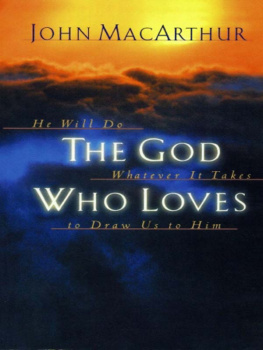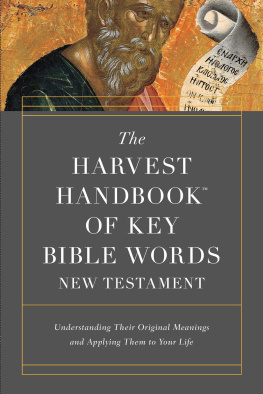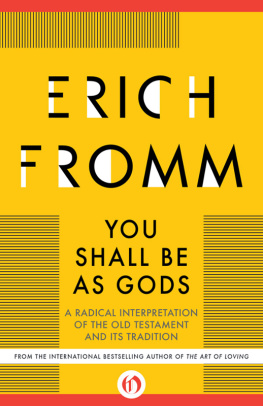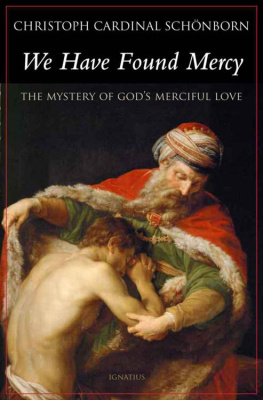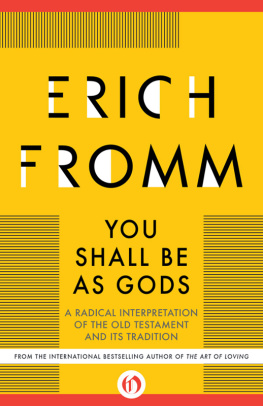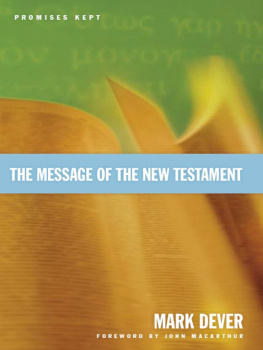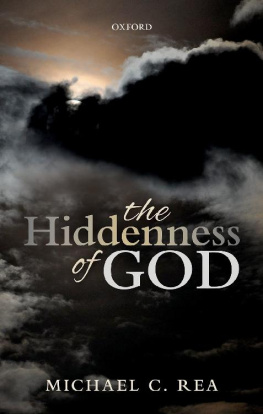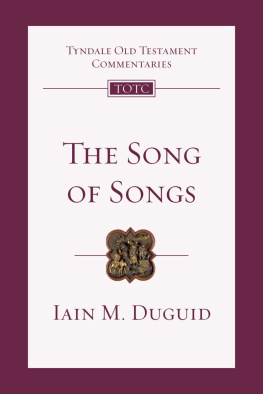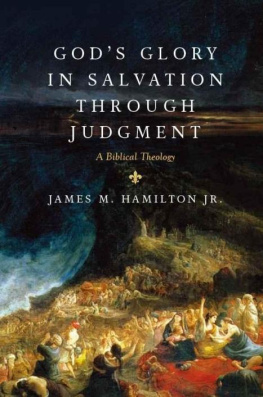Copyright 2014 Thomas B. Talbott. All rights reserved. Except for brief quotations in critical publications or reviews, no part of this book may be reproduced in any manner without prior written permission from the publisher. Write: Permissions, Wipf and Stock Publishers, 199 W. 8th Ave., Suite 3, Eugene, OR 97401.
199 W. 8th Ave., Suite 3
Talbott, Thomas B.
The inescapable love of God : second edition / Thomas Talbott.
xvi + 238 p.; 23 cmIncludes bibliographical references and index.
1. UniversalismBiblical teaching. 2. SalvationBiblical teaching. 3. HellChristianity. I. Title.
Manufactured in the USA.
Heaven will solve our problems, but not, I think, by showing us subtle reconciliations between all our apparently contradictory notions. The notions will all be knocked from under our feet. We shall see that there never was any problem.
And, more than once, that impression which I cant describe except by saying its like the sound of a chuckle in the darkness. The sense that some shattering and disarming simplicity is the real answer.
C. S. Lewis, A Grief Observed
Preface to the Second Edition
B ecause I am rarely satisfied with my own prose and often wish after publishing something that I had expressed myself more clearly as well as in greater detail, I have revised this book substantially in its second edition. In addition to minor stylistic changes throughout and a host of new footnotes, major revisions include:
An additional chapter entitled Predestination unto Glory, which is now chapter 12 of this revised edition;
Four new sections in previously existing chapters:
A section entitled The Rich Man and Lazarus in chapter 6, Eschatological Punishment;
A section entitled Concerning the Evidential Argument in chapter 10, Omnipotence and Evil;
A section entitled Two Very Different Images: The Lake of Fire and the Outer Darkness in chapter 11, God, Freedom, and Human Destiny;
A section entitled The Problem of Evil: Some Further Reflections in chapter 13 (formerly chapter 12), Loves Final Victory;
Substantially updated arguments elsewhere in the chapters just cited and in chapters 4, 5, and 6 as well.
Updated arguments include, among other things, a response to Douglas J. Moos rather fantastic effort to explain away Pauls use of all in Romans 5:18 and elsewhere, a further response to his fallacious inference that the deliberately worded v. 17 [of Rom. 5]... makes it clear that only certain people derive the benefits from Christs act of righteousness, a response to Anthony C. Thiselton on the correct translation of 1 Corinthians 15:24 and its relevance to the universalism of verses 2028, and a response to Michael Murrays quandary about the purpose of an earthly life on the assumption that universalism is true. Elsewhere I have also made relatively minor revisions in an effort to achieve greater clarity and precisionas, for instance, where a few added sentences in chapter 7 and a reference to Romans 11:16 enabled me to nail down much more forcefully, I hope, the inclusive nature of election, as Paul himself understood it. But new material is never easy to incorporate smoothly into an existing work and often requires both additions and subtractions in other parts of the work. So I can only hope that the end product here benefits from greater clarity and precision without having become more convoluted and pedantic than the original.
Even as the first edition included material, sometimes rewritten for a general audience, from previously published articles, so this second edition includes ideas, and even some language in a few cases, from material published since 1999. These include, in reverse order of publication:
The Topography of Divine Love: A Response to Jeff Jordan. Faith and Philosophy 30 (2013) 30216.
The Just Mercy of God: Universal Salvation in George MacDonald (18241905). In All Shall Be Well , edited by Gregory MacDonald, 21946. Eugene, OR: Cascade, 2011.
Grace, Character Formation, and Predestination unto Glory. In The Problem of Hell: A Philosophical Anthology , edited by Joel Buenting, chapter . Burlington, VT: Ashgate, 2010.
God, Freedom, and Human Agency. Faith and Philosophy 26 (2009) 37897.
Why Christians Should Not Be Determinists: Reflections on the Origin of Human Sin. Faith and Philosophy 25 (2008) 37897.
Universalism. In The Oxford Handbook of Eschatology , edited by Jerry Walls, 44749 . New York: Oxford University Press, 2007.
Universal Reconciliation and the Inclusive Nature of Election. In Perspectives on Election: Five Views , edited by Chad Owen Brand, 20661. Nashville: Broadman and Holman, 2006.
Misery and Freedom: Reply to Walls. Religious Studies 40 (2005) 21724.
Four chapters in Universal Salvation? The Contemporary Debate , edited by Robin Parry and Christopher Partridge. Carlisle, UK: Paternoster, 2004.
Freedom, Damnation, and the Power to Sin with Impunity. Religious Studies 37 (2001) 41734.
Universalism and the Supposed Oddity of Our Earthly Life: Reply to Michael Murray. Faith and Philosophy 18 (2001) 1029.
Behind all of these writings, taken as a group, lies my own conviction that St. Pauls pre-philosophical understanding of Gods all-pervasive grace provides a perfectly clear picture of how free will, indeterminism, and even sheer chance, if you will, could fit into a predestinarian scheme in which a glorious end for each of us is ultimately inescapable. That Gods grace is utterly irresistible over the long run now seems to me the best interpretation of Pauline theology, as a majority of theologians in the West have always insisted. But when I say that this grace is irresistible over the long run, I in no way endorse the view that God himself causally determines every event that occurs, whether it be the change of state of a radium atom, a dogs leaping this way rather than that while romping in the yard, or the rational choice of an independent free agent. For as I now argue more fully in chapter 12, God has no need to control our individual choices in order to checkmate each of us in the end; he need only permit us to experience the very condition of separation that we sometimes confusedly choose for ourselves. So even though we are indeed free to resist Gods grace for a season, perhaps even for a substantial period of time, that very resistance will at some point produce an irresistible means of grace; hence, no one, I argue, is free to resist that grace forever (see chapter 12 for the details).
Accordingly, however tragically mistaken a majority of theologians in the West have been about the limited extent of Gods grace in Pauline theology, they have nonetheless been quite right, in my opinion, about its irresistible nature over an indefinitely long period of time. In Part II of this second edition, I thus continue to argue on exegetical grounds that, according to Paul and the New Testament as a whole, the entire human race was unconditionally elected in Jesus Christ; and in Part III, I supplement these exegetical arguments with some additional exegetical arguments not included in the first edition and with a more complete philosophical discussion of human freedom and its essential role in the process whereby God reconciles the entire human race to himself.



